无锡人文介绍(英文)
- 格式:ppt
- 大小:1.14 MB
- 文档页数:22
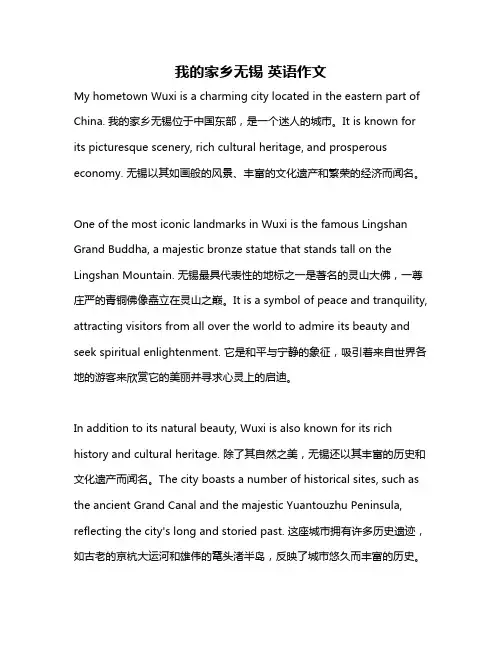
我的家乡无锡英语作文My hometown Wuxi is a charming city located in the eastern part of China. 我的家乡无锡位于中国东部,是一个迷人的城市。
It is known for its picturesque scenery, rich cultural heritage, and prosperous economy. 无锡以其如画般的风景、丰富的文化遗产和繁荣的经济而闻名。
One of the most iconic landmarks in Wuxi is the famous Lingshan Grand Buddha, a majestic bronze statue that stands tall on the Lingshan Mountain. 无锡最具代表性的地标之一是著名的灵山大佛,一尊庄严的青铜佛像矗立在灵山之巅。
It is a symbol of peace and tranquility, attracting visitors from all over the world to admire its beauty and seek spiritual enlightenment. 它是和平与宁静的象征,吸引着来自世界各地的游客来欣赏它的美丽并寻求心灵上的启迪。
In addition to its natural beauty, Wuxi is also known for its rich history and cultural heritage. 除了其自然之美,无锡还以其丰富的历史和文化遗产而闻名。
The city boasts a number of historical sites, such as the ancient Grand Canal and the majestic Yuantouzhu Peninsula, reflecting the city's long and storied past. 这座城市拥有许多历史遗迹,如古老的京杭大运河和雄伟的鼋头渚半岛,反映了城市悠久而丰富的历史。
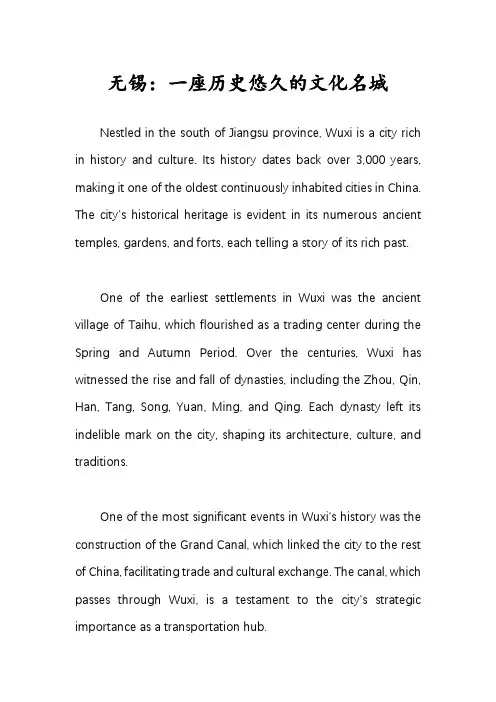
无锡:一座历史悠久的文化名城Nestled in the south of Jiangsu province, Wuxi is a city rich in history and culture. Its history dates back over 3,000 years, making it one of the oldest continuously inhabited cities in China. The city's historical heritage is evident in its numerous ancient temples, gardens, and forts, each telling a story of its rich past.One of the earliest settlements in Wuxi was the ancient village of Taihu, which flourished as a trading center during the Spring and Autumn Period. Over the centuries, Wuxi has witnessed the rise and fall of dynasties, including the Zhou, Qin, Han, Tang, Song, Yuan, Ming, and Qing. Each dynasty left its indelible mark on the city, shaping its architecture, culture, and traditions.One of the most significant events in Wuxi's history was the construction of the Grand Canal, which linked the city to the rest of China, facilitating trade and cultural exchange. The canal, which passes through Wuxi, is a testament to the city's strategic importance as a transportation hub.Another noteworthy aspect of Wuxi's history is its association with many famous literary figures and scholars. One such figure was the Ming dynasty painter and calligrapher Wen Zhengming, who is renowned for his contributions to the development of Chinese landscape painting. His influence can still be seen in the city's many temples and pavilions, which feature his paintings and inscriptions.In addition to its rich cultural heritage, Wuxi is also famous for its natural beauty. The city is surrounded by lush green hills and the serene waters of Lake Taihu, providing a scenic backdrop for its historical landmarks. The beauty of Lake Taihu, in particular, has inspired countless poets and artists throughout the ages.Today, Wuxi has emerged as a modern city, blending its historical heritage with contemporary development. The city is home to numerous industries, including high-tech manufacturing, services, and tourism, making it an important economic center in the region. Despite its rapid modernization, Wuxi has managed to preserve much of its historical fabric, allowing visitors toexperience a unique blend of old and new.In conclusion, Wuxi is a city that offers a fascinating glimpse into China's rich historical past. Its historical landmarks, cultural traditions, and natural beauty provide a unique and memorable experience for visitors from around the world. As one of the oldest continuously inhabited cities in China, Wuxi continues to thrive as a cultural and economic center, offering a captivating blend of history and modernity.**无锡:历史悠久的文化名城**无锡,这座位于江苏省南部的城市,拥有丰富的历史和文化底蕴。
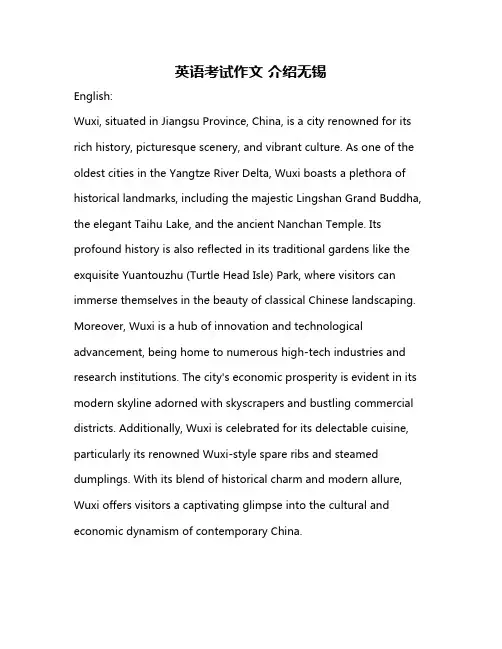
英语考试作文介绍无锡English:Wuxi, situated in Jiangsu Province, China, is a city renowned for its rich history, picturesque scenery, and vibrant culture. As one of the oldest cities in the Yangtze River Delta, Wuxi boasts a plethora of historical landmarks, including the majestic Lingshan Grand Buddha, the elegant Taihu Lake, and the ancient Nanchan Temple. Its profound history is also reflected in its traditional gardens like the exquisite Yuantouzhu (Turtle Head Isle) Park, where visitors can immerse themselves in the beauty of classical Chinese landscaping. Moreover, Wuxi is a hub of innovation and technological advancement, being home to numerous high-tech industries and research institutions. The city's economic prosperity is evident in its modern skyline adorned with skyscrapers and bustling commercial districts. Additionally, Wuxi is celebrated for its delectable cuisine, particularly its renowned Wuxi-style spare ribs and steamed dumplings. With its blend of historical charm and modern allure, Wuxi offers visitors a captivating glimpse into the cultural and economic dynamism of contemporary China.中文翻译:无锡位于中国江苏省,以悠久的历史、如画般的景色和充满活力的文化而闻名。
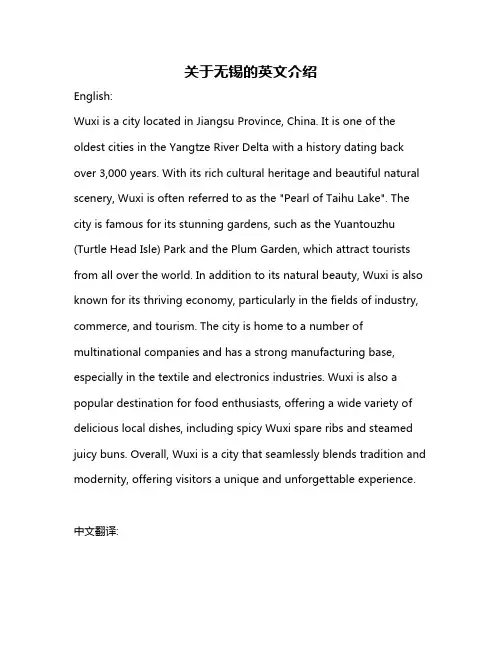
关于无锡的英文介绍English:Wuxi is a city located in Jiangsu Province, China. It is one of the oldest cities in the Yangtze River Delta with a history dating back over 3,000 years. With its rich cultural heritage and beautiful natural scenery, Wuxi is often referred to as the "Pearl of Taihu Lake". The city is famous for its stunning gardens, such as the Yuantouzhu (Turtle Head Isle) Park and the Plum Garden, which attract tourists from all over the world. In addition to its natural beauty, Wuxi is also known for its thriving economy, particularly in the fields of industry, commerce, and tourism. The city is home to a number of multinational companies and has a strong manufacturing base, especially in the textile and electronics industries. Wuxi is also a popular destination for food enthusiasts, offering a wide variety of delicious local dishes, including spicy Wuxi spare ribs and steamed juicy buns. Overall, Wuxi is a city that seamlessly blends tradition and modernity, offering visitors a unique and unforgettable experience.中文翻译:无锡位于中国江苏省,是长江三角洲地区最古老的城市之一,有着三千多年的历史。
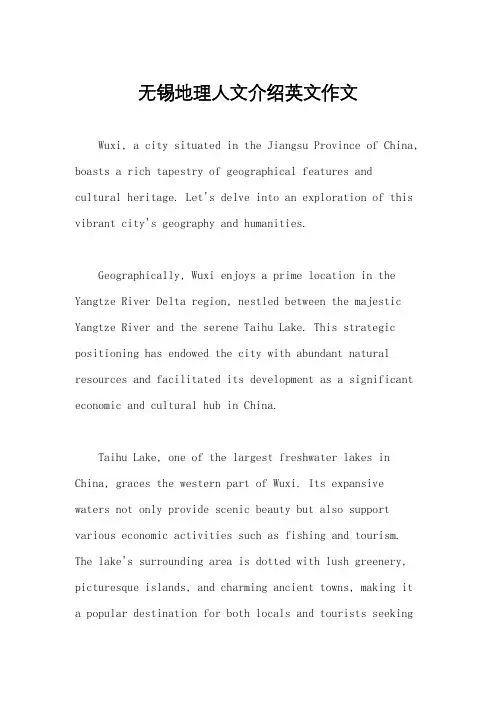
无锡地理人文介绍英文作文Wuxi, a city situated in the Jiangsu Province of China, boasts a rich tapestry of geographical features andcultural heritage. Let's delve into an exploration of this vibrant city's geography and humanities.Geographically, Wuxi enjoys a prime location in the Yangtze River Delta region, nestled between the majestic Yangtze River and the serene Taihu Lake. This strategic positioning has endowed the city with abundant natural resources and facilitated its development as a significant economic and cultural hub in China.Taihu Lake, one of the largest freshwater lakes in China, graces the western part of Wuxi. Its expansive waters not only provide scenic beauty but also support various economic activities such as fishing and tourism. The lake's surrounding area is dotted with lush greenery, picturesque islands, and charming ancient towns, making it a popular destination for both locals and tourists seekingtranquility and natural beauty.On the eastern side of Wuxi flows the mighty Yangtze River, known as the "Mother River" of China. This iconic river not only serves as a vital transportation artery but also plays a crucial role in the region's irrigation system, supporting agriculture and sustaining livelihoods along its banks.Beyond its geographical features, Wuxi boasts a rich cultural heritage that spans thousands of years. The city's history can be traced back to ancient times, with archaeological evidence indicating human habitation as far back as the Neolithic period. Over the centuries, Wuxi has been shaped by various dynasties, each leaving its mark on the city's architecture, arts, and traditions.One of Wuxi's most renowned cultural landmarks is the Grand Canal, a UNESCO World Heritage Site that traversesthe city. This ancient waterway, stretching over 1,700 kilometers, served as a vital artery for trade and transportation during imperial China. Today, the GrandCanal remains a testament to Wuxi's historical significance and continues to be a bustling hub of activity.In addition to its historical sites, Wuxi is also celebrated for its traditional arts and crafts, including the famous Wuxi clay figurines and silk embroidery. These intricate art forms have been passed down through generations, embodying the city's rich cultural heritage and artistic prowess.Moreover, Wuxi is a melting pot of diverse cultural influences, owing to its history as a thriving center of commerce and exchange. Over the centuries, merchants, scholars, and artisans from across China and beyond have flocked to Wuxi, bringing with them a wealth of ideas, customs, and traditions. This cultural diversity is reflected in the city's culinary scene, with Wuxi cuisine renowned for its delicate flavors and exquisite craftsmanship.In conclusion, Wuxi is a city of remarkable geographical beauty and cultural significance. From itsscenic lakes and rivers to its ancient landmarks and vibrant cultural heritage, Wuxi offers a captivating glimpse into China's rich history and heritage. Whether exploring its historic sites, savoring its culinary delights, or simply basking in its natural splendor, visitors to Wuxi are sure to be enchanted by all that this extraordinary city has to offer.。
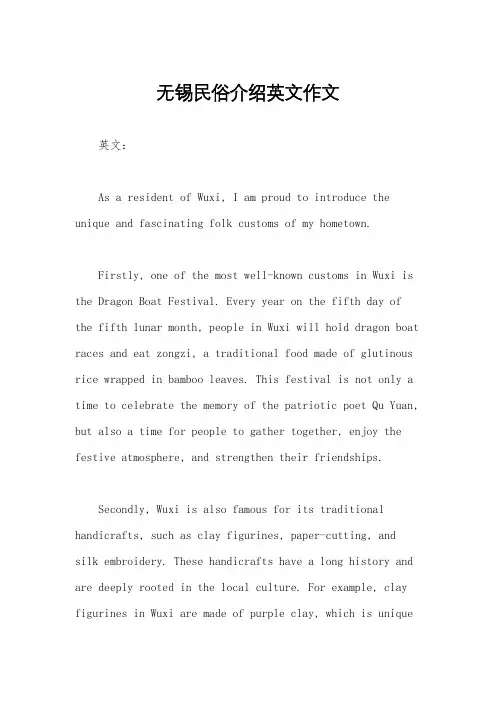
无锡民俗介绍英文作文英文:As a resident of Wuxi, I am proud to introduce the unique and fascinating folk customs of my hometown.Firstly, one of the most well-known customs in Wuxi is the Dragon Boat Festival. Every year on the fifth day of the fifth lunar month, people in Wuxi will hold dragon boat races and eat zongzi, a traditional food made of glutinous rice wrapped in bamboo leaves. This festival is not only a time to celebrate the memory of the patriotic poet Qu Yuan, but also a time for people to gather together, enjoy the festive atmosphere, and strengthen their friendships.Secondly, Wuxi is also famous for its traditional handicrafts, such as clay figurines, paper-cutting, andsilk embroidery. These handicrafts have a long history and are deeply rooted in the local culture. For example, clay figurines in Wuxi are made of purple clay, which is uniqueto the area. The figurines are usually small and vivid, and can be used as decorations or as toys for children. Paper-cutting in Wuxi is also exquisite, with intricate designs and delicate details. Silk embroidery is anothertraditional handicraft in Wuxi, which is known for its bright colors and fine workmanship.Lastly, Wuxi is also famous for its delicious food. Some of the most popular local dishes include Wuxi spareribs, fried gluten balls, and steamed buns with pork filling. Wuxi spareribs are marinated in a special sauce made of soy sauce, sugar, and other ingredients, and then braised until they are tender and juicy. Fried gluten balls are made of gluten flour and stuffed with various fillings, such as pork, shrimp, or vegetables. Steamed buns with pork filling are a classic breakfast food in Wuxi, with soft and fluffy buns and savory pork filling.中文:作为无锡的居民,我很自豪地介绍我的家乡独特而迷人的民俗文化。
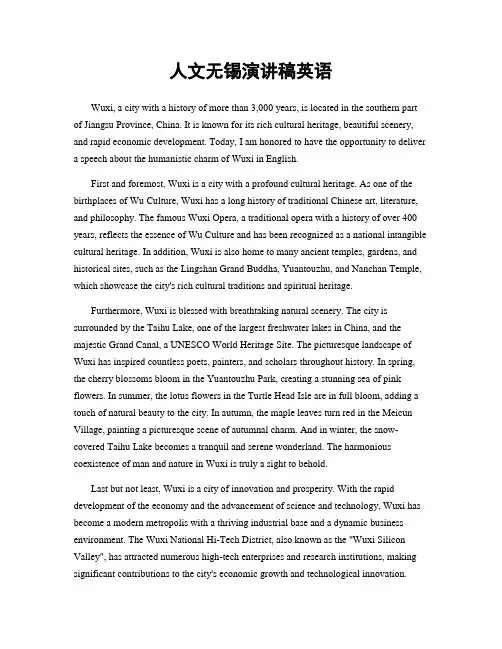
人文无锡演讲稿英语Wuxi, a city with a history of more than 3,000 years, is located in the southern part of Jiangsu Province, China. It is known for its rich cultural heritage, beautiful scenery, and rapid economic development. Today, I am honored to have the opportunity to deliver a speech about the humanistic charm of Wuxi in English.First and foremost, Wuxi is a city with a profound cultural heritage. As one of the birthplaces of Wu Culture, Wuxi has a long history of traditional Chinese art, literature, and philosophy. The famous Wuxi Opera, a traditional opera with a history of over 400 years, reflects the essence of Wu Culture and has been recognized as a national intangible cultural heritage. In addition, Wuxi is also home to many ancient temples, gardens, and historical sites, such as the Lingshan Grand Buddha, Yuantouzhu, and Nanchan Temple, which showcase the city's rich cultural traditions and spiritual heritage.Furthermore, Wuxi is blessed with breathtaking natural scenery. The city is surrounded by the Taihu Lake, one of the largest freshwater lakes in China, and the majestic Grand Canal, a UNESCO World Heritage Site. The picturesque landscape of Wuxi has inspired countless poets, painters, and scholars throughout history. In spring, the cherry blossoms bloom in the Yuantouzhu Park, creating a stunning sea of pink flowers. In summer, the lotus flowers in the Turtle Head Isle are in full bloom, adding a touch of natural beauty to the city. In autumn, the maple leaves turn red in the Meicun Village, painting a picturesque scene of autumnal charm. And in winter, the snow-covered Taihu Lake becomes a tranquil and serene wonderland. The harmonious coexistence of man and nature in Wuxi is truly a sight to behold.Last but not least, Wuxi is a city of innovation and prosperity. With the rapid development of the economy and the advancement of science and technology, Wuxi has become a modern metropolis with a thriving industrial base and a dynamic business environment. The Wuxi National Hi-Tech District, also known as the "Wuxi Silicon Valley", has attracted numerous high-tech enterprises and research institutions, making significant contributions to the city's economic growth and technological innovation.Moreover, Wuxi is also a pioneer in sustainable development and environmental protection, with a number of eco-friendly initiatives and green projects in place to create a better living environment for its residents.In conclusion, Wuxi is a city with a rich cultural heritage, stunning natural scenery, and a vibrant economy. Its humanistic charm is deeply rooted in its history, culture, and people. As we continue to embrace globalization and cultural exchange, it is my hope that Wuxi will continue to shine on the world stage, sharing its unique humanistic appeal with people from all walks of life. Thank you.。
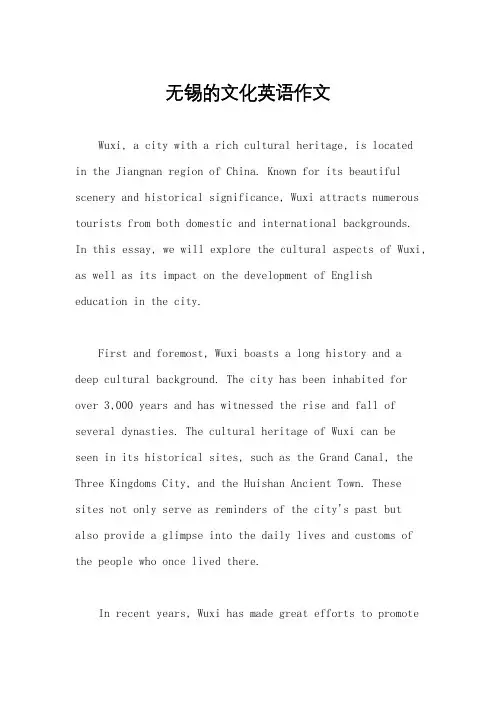
无锡的文化英语作文Wuxi, a city with a rich cultural heritage, is locatedin the Jiangnan region of China. Known for its beautiful scenery and historical significance, Wuxi attracts numerous tourists from both domestic and international backgrounds.In this essay, we will explore the cultural aspects of Wuxi, as well as its impact on the development of English education in the city.First and foremost, Wuxi boasts a long history and a deep cultural background. The city has been inhabited for over 3,000 years and has witnessed the rise and fall of several dynasties. The cultural heritage of Wuxi can beseen in its historical sites, such as the Grand Canal, the Three Kingdoms City, and the Huishan Ancient Town. These sites not only serve as reminders of the city's past but also provide a glimpse into the daily lives and customs of the people who once lived there.In recent years, Wuxi has made great efforts to promoteEnglish education and cultural exchange. As an important economic and cultural center in China, Wuxi recognizes the importance of English proficiency in the globalized world. To meet the increasing demand for English education, the city has established numerous English training centers and schools. These institutions not only provide English language courses but also offer cultural exchange programs, allowing students to learn about Western culture and customs.Moreover, Wuxi has actively participated in international cultural exchange activities. The city has hosted various cultural events, such as the Wuxi International Cherry Blossom Festival and the Wuxi Taihu Lake International Marathon. These events not only attract tourists from around the world but also provide opportunities for cultural exchange and cooperation.The impact of Wuxi's cultural development on English education in the city cannot be underestimated. The promotion of cultural exchange has greatly enhanced the quality of English education in Wuxi. Students not onlylearn the language but also gain a deeper understanding of Western culture and customs. This not only helps them to communicate effectively in English but also broadens their horizons and enhances their cultural awareness.In addition, the cultural heritage of Wuxi has inspired the development of English education in the city. The historical sites and cultural landmarks serve as valuable resources for English teachers to design interesting and engaging lessons. For example, students can learn about the history of the Grand Canal or the Three Kingdoms through English language courses, thereby combining language learning with cultural exploration.Furthermore, the cultural diversity in Wuxi has attracted foreign English teachers to work in the city. These teachers bring with them their own cultural background and teaching methods, enriching the English education environment in Wuxi. Students have the opportunity to learn from native speakers and experience different teaching styles, which further enhances their language learning experience.In conclusion, Wuxi's rich cultural heritage and its commitment to cultural exchange have greatly influenced the development of English education in the city. The promotion of cultural exchange and the utilization of cultural resources have not only enhanced the quality of English education but also broadened students' horizons. With its vibrant cultural scene and dedication to English education, Wuxi will continue to play a significant role in promoting cultural exchange and language learning in China.。
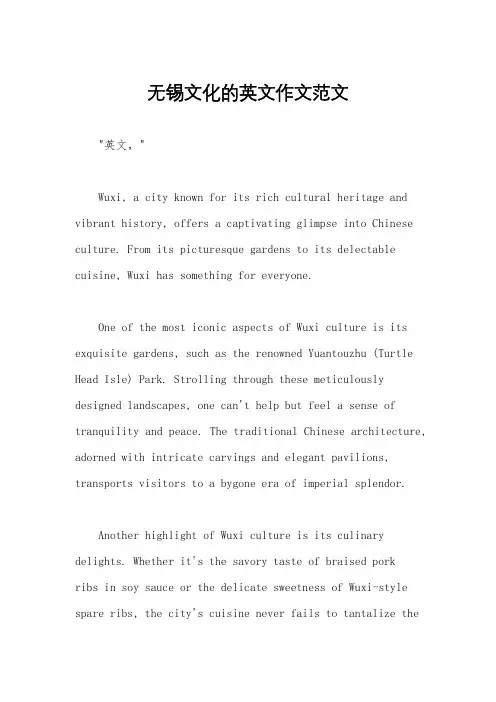
无锡文化的英文作文范文"英文,"Wuxi, a city known for its rich cultural heritage and vibrant history, offers a captivating glimpse into Chinese culture. From its picturesque gardens to its delectable cuisine, Wuxi has something for everyone.One of the most iconic aspects of Wuxi culture is its exquisite gardens, such as the renowned Yuantouzhu (Turtle Head Isle) Park. Strolling through these meticulously designed landscapes, one can't help but feel a sense of tranquility and peace. The traditional Chinese architecture, adorned with intricate carvings and elegant pavilions, transports visitors to a bygone era of imperial splendor.Another highlight of Wuxi culture is its culinary delights. Whether it's the savory taste of braised porkribs in soy sauce or the delicate sweetness of Wuxi-style spare ribs, the city's cuisine never fails to tantalize thetaste buds. One cannot miss the opportunity to indulge in a bowl of steaming hot Wuxi-style soup dumplings, known locally as "xiaolongbao," which burst with flavorful broth with every bite.In addition to its gardens and cuisine, Wuxi is also home to a thriving arts scene. The city's vibrant theater productions and traditional Chinese opera performances showcase the depth and richness of Chinese cultural heritage. Whether it's a classic opera like "The Peony Pavilion" or a modern theatrical production, audiences are treated to an unforgettable experience that celebrates the essence of Wuxi culture."中文,"无锡,一个以其丰富的文化遗产和充满活力的历史而闻名的城市,为我们提供了一个迷人的窥视中国文化的机会。
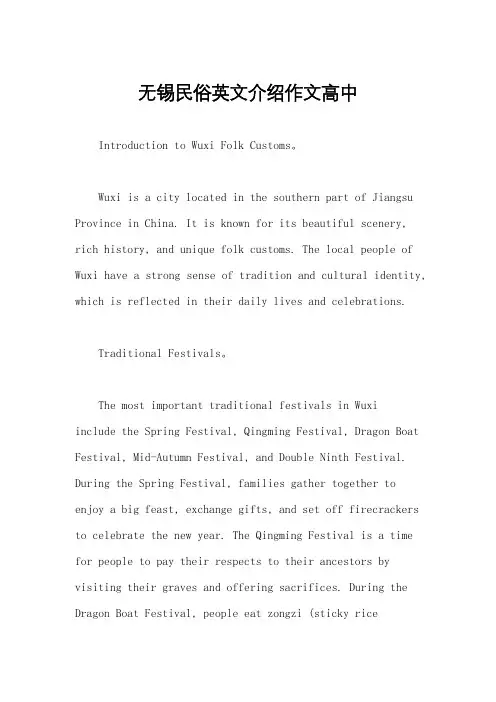
无锡民俗英文介绍作文高中Introduction to Wuxi Folk Customs。
Wuxi is a city located in the southern part of Jiangsu Province in China. It is known for its beautiful scenery, rich history, and unique folk customs. The local people of Wuxi have a strong sense of tradition and cultural identity, which is reflected in their daily lives and celebrations.Traditional Festivals。
The most important traditional festivals in Wuxiinclude the Spring Festival, Qingming Festival, Dragon Boat Festival, Mid-Autumn Festival, and Double Ninth Festival. During the Spring Festival, families gather together to enjoy a big feast, exchange gifts, and set off firecrackers to celebrate the new year. The Qingming Festival is a time for people to pay their respects to their ancestors by visiting their graves and offering sacrifices. During the Dragon Boat Festival, people eat zongzi (sticky ricewrapped in bamboo leaves) and watch dragon boat races. The Mid-Autumn Festival is a time for family reunions and eating mooncakes. The Double Ninth Festival is celebrated by climbing mountains and drinking chrysanthemum wine.Local Cuisine。
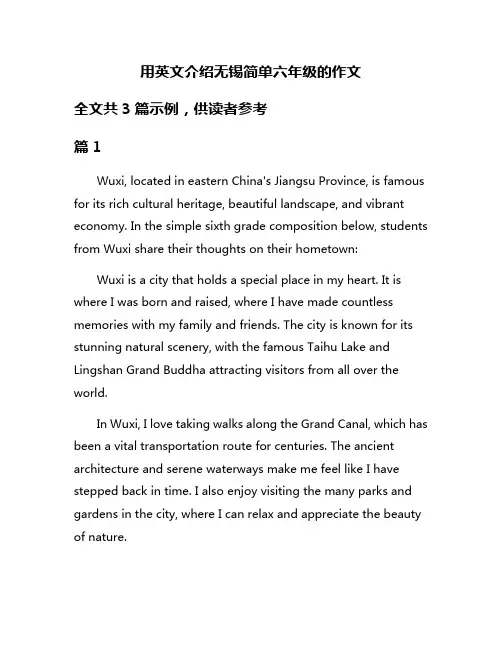
用英文介绍无锡简单六年级的作文全文共3篇示例,供读者参考篇1Wuxi, located in eastern China's Jiangsu Province, is famous for its rich cultural heritage, beautiful landscape, and vibrant economy. In the simple sixth grade composition below, students from Wuxi share their thoughts on their hometown:Wuxi is a city that holds a special place in my heart. It is where I was born and raised, where I have made countless memories with my family and friends. The city is known for its stunning natural scenery, with the famous Taihu Lake and Lingshan Grand Buddha attracting visitors from all over the world.In Wuxi, I love taking walks along the Grand Canal, which has been a vital transportation route for centuries. The ancient architecture and serene waterways make me feel like I have stepped back in time. I also enjoy visiting the many parks and gardens in the city, where I can relax and appreciate the beauty of nature.One of the things that make Wuxi special is its rich cultural heritage. The city is home to many historical sites, such as the Nanchan Temple and the Huishan Ancient Town. These places are a reminder of Wuxi's long and storied past, and I feel proud to be a part of such a vibrant and historical city.In addition to its natural beauty and cultural attractions, Wuxi is also a hub for innovation and technology. The city is known for its thriving economy and is home to many high-tech companies, such as Huawei and Suntech. As a student in Wuxi, I am grateful for the opportunity to learn from some of the brightest minds in the industry.Overall, Wuxi is a city that is close to my heart. Its natural beauty, rich history, and dynamic economy make it a truly special place to call home. I am proud to be a part of this vibrant community and look forward to seeing what the future holds for my beloved city.篇2IntroductionWuxi, a city in China, is known for its beautiful scenery, rich culture, and delicious food. In this document, I will introduce asimple sixth-grade essay about Wuxi, written by a student from Wuxi.BodyThe essay starts with a brief introduction about Wuxi, highlighting its location in eastern China and its long history. The student then goes on to describe the city's famous landmarks, such as the Lingshan Grand Buddha, Taihu Lake, and the Nanchan Temple. The student also mentions Wuxi's thriving economy and the development of industries like textiles and electronics.One of the key points in the essay is the student's love for Wuxi's local cuisine. The student talks about the deliciousWuxi-style spare ribs, steamed dumplings, and fried rice cakes that are popular in the city. The student also mentions the famous Wuxi-style noodles, which are known for their unique texture and flavor.In addition to the city's attractions and food, the student also highlights the friendly people of Wuxi and the warm hospitality they show to visitors. The student describes how the local residents are always willing to help others and make them feel welcome in the city.The essay concludes with a summary of the student's overall impression of Wuxi. The student expresses pride in their hometown and encourages others to visit and experience all that Wuxi has to offer.ConclusionIn conclusion, this simple sixth-grade essay about Wuxi showcases the city's beauty, culture, and hospitality through the eyes of a young student. The essay not only highlights Wuxi's famous landmarks and delicious cuisine but also emphasizes the kindness of its people. Overall, this essay is a wonderful tribute to Wuxi and its many charms.篇3Wuxi is a beautiful city located in Jiangsu Province, China. It is known for its scenic Lake Tai, historic temples, and delicious local cuisine. In this document, we will introduce the simple composition written by a sixth-grade student in Wuxi.The sixth-grade student in Wuxi wrote a composition about his weekend trip to Xihui Park. Xihui Park is a large park located in Wuxi that is famous for its lush greenery, serene lakes, andhistoric buildings. The student described how he visited the park with his family on a sunny Saturday morning.In the composition, the student vividly described the sights and sounds of Xihui Park. He talked about how they walked along the tree-lined paths, feeding the ducks in the lake, and admiring the colorful flowers in the botanical garden. The student also mentioned visiting the ancient Xihui Monastery, a historic temple located within the park.The student's composition was well-organized and engaging, with a clear introduction, body, and conclusion. He used descriptive language to paint a picture of the park for his readers, and his enthusiasm for the subject matter shone through in his writing.Overall, the sixth-grade student's composition about his trip to Xihui Park was a simple yet engaging piece of writing. It showcased his love for his hometown of Wuxi and his ability to convey his experiences in a clear and engaging manner. In the future, we hope to see more creative and well-written compositions from this talented young writer.。
为朋友介绍无锡的英语作文7Wuxi, a city nestled in the heart of China's Jiangsu province, is a place of serene beauty and rich cultural heritage. It's a city that I am proud to call my home, and I am eager to share its wonders with you, my friend.Nestled along the banks of the Grand Canal, Wuxi has been a hub of trade and commerce for centuries. The city's skyline is a harmonious blend of modern architecture and traditional Chinese structures, a testament to its progressive spiritwhile still honoring its roots.One of the must-see attractions in Wuxi is the Taihu Lake, known as the "Pearl of the Yangtze River." The lake's vast expanse and crystal-clear waters are a sight to behold, especially during the spring when the cherry blossoms alongits shores come into full bloom.For those interested in history, the city offers a wealth of ancient sites. The Xuebu Taoist Temple, with its red walls and yellow-tiled roofs, stands as a beacon of spiritual tranquility amidst the bustling city life. It's a place where you can find respite and a deeper connection with the city's cultural soul.Wuxi is also famous for its silk, which has been produced here for over a thousand years. The city's silk industry isnot just a testament to its economic prowess but also to thecraftsmanship and artistry of its people. Visiting a localsilk factory is an experience in itself, where you canwitness the transformation of silkworm cocoons into exquisite fabrics.No introduction to Wuxi would be complete without mentioning its culinary delights. The city's signature dish, "Beggar's Chicken," is a succulent delight that is said to have been created by an impoverished man who wanted to share his love for food with others. The dish is a perfect blend of flavors and a true reflection of Wuxi's warmth and generosity.Lastly, the city's parks and gardens are a haven fornature lovers. The Wuxi National Park, with its lush greenery and tranquil walking paths, is an ideal place to unwind and enjoy the natural beauty that Wuxi has to offer.In conclusion, Wuxi is a city that offers a unique blendof history, culture, and natural beauty. Whether you're a history buff, a nature enthusiast, or a food connoisseur,there's something for everyone in this charming city. I hope this brief introduction has piqued your interest, and I look forward to showing you the many facets of Wuxi in person.。
写一篇英语作文介绍无锡Wuxi, located in Jiangsu Province, China, is a cityrich in history, culture, and natural beauty. As one of the oldest cities in the Yangtze River Delta, Wuxi has a long-standing reputation for its picturesque scenery, thriving economy, and vibrant cultural heritage.Firstly, let's delve into the historical significance of Wuxi. With a history spanning over 3,000 years, Wuxi boasts a plethora of historical sites and landmarks. One of the most famous attractions is the Grand Canal, a UNESCO World Heritage Site that passes through the city. The Grand Canal played a crucial role in ancient China's transportation and economic development, and its presencein Wuxi reflects the city's importance as a hub of commerce and culture.In addition to its historical landmarks, Wuxi is renowned for its breathtaking natural scenery. The city is surrounded by stunning lakes and mountains, earning it thenickname "Land of Fish and Rice." Lake Tai, the third-largest freshwater lake in China, is a must-visitdestination for nature lovers. Visitors can enjoy leisurely boat rides, explore scenic islands, and admire the tranquil beauty of the lake's surroundings. Furthermore, themajestic Mount Lingshan offers panoramic views of the cityscape and is home to the renowned Lingshan Grand Buddha, a towering statue that symbolizes peace and harmony.Apart from its natural beauty, Wuxi is also a bustling metropolis with a thriving economy and vibrant cultural scene. As a key player in China's economic reform and opening-up policies, Wuxi has undergone rapid developmentin recent decades, becoming a major center for industry, commerce, and technology. The city is home to numeroushigh-tech enterprises, research institutes, and industrial parks, contributing significantly to China's economicgrowth and innovation.Moreover, Wuxi is a cultural melting pot with a rich heritage of art, literature, and cuisine. The city's traditional arts and crafts, such as clay figurines andsilk embroidery, reflect its long history of craftsmanship and creativity. Additionally, Wuxi's culinary scene is a gastronomic delight, offering a diverse array of regional delicacies and local specialties. From savory dumplings to sweet pastries, Wuxi's culinary delights are sure to tantalize the taste buds of visitors from near and far.In conclusion, Wuxi is a city of contrasts, where ancient traditions coexist harmoniously with modernity. Whether you're exploring its historical landmarks, admiring its natural beauty, or experiencing its vibrant culture, Wuxi offers a wealth of experiences and opportunities for discovery. With its rich history, stunning scenery, and dynamic economy, Wuxi truly deserves its reputation as a gem of the Yangtze River Delta.。
无锡民俗英文作文高中Wuxi is a city with rich folk customs. People here like to celebrate traditional festivals, such as the Spring Festival and the Dragon Boat Festival. During these festivals, you can see various folk activities, such as dragon and lion dances, lantern riddles, and the custom of eating sticky rice dumplings. It's really interesting to experience these traditional customs.The dialect in Wuxi is quite unique. It's a combination of the Wu dialect and the Taihu dialect, which gives it a special charm. When you hear people speaking in the Wuxi dialect, you can feel the local flavor and the warmth of the people. It's definitely a part of the local folkculture that is worth exploring.Wuxi is also known for its traditional crafts, such as clay figurines, Yixing pottery, and silk embroidery. These crafts have a long history and are deeply rooted in the local culture. The exquisite craftsmanship and uniqueartistic styles make them popular among both locals and tourists. It's a great way to appreciate the beauty of Wuxi's folk art.The traditional folk songs and dances in Wuxi are also worth mentioning. The lively and rhythmic folk dances, accompanied by melodious folk songs, are a reflection of the local people's joy and enthusiasm for life. It's a wonderful experience to watch or even participate in these traditional performances.In Wuxi, there are also many traditional folk customs related to weddings, funerals, and other important life events. These customs are passed down from generation to generation and play an important role in preserving the local culture. It's fascinating to learn about the unique customs and rituals that are still practiced in Wuxi today.。
无锡文化英文介绍English: Wuxi, situated in Jiangsu Province, China, boasts a rich cultural heritage that spans thousands of years. Renowned for its picturesque landscapes, Wuxi is often referred to as the "Land of Fish and Rice" due to its fertile soil and abundant aquatic resources. The city is deeply rooted in traditional Chinese culture, evident in its ancient temples, classical gardens, and traditional crafts such as clay figurine making and silk production. Wuxi is also famous for its operatic art, particularly the Wuxi Opera, which originated in the Ming Dynasty and continues to captivate audiences with its unique melodies and graceful movements. Additionally, Wuxi is home to the Grand Canal, a UNESCO World Heritage Site that played a vital role in China's ancient transportation and trade. Modern Wuxi seamlessly blends its rich cultural heritage with rapid economic development, making it a vibrant metropolis with a unique charm that attracts visitors from around the globe.中文翻译: 无锡位于中国江苏省,拥有数千年的丰富文化传承。
无锡:太湖明珠的璀璨之光Nestled in the heart of Jiangsu province, Wuxi stands as a shining beacon on the banks of the beautiful Taihu Lake. Known for its lush greenery, vibrant culture, and robust economy, Wuxi offers a unique blend of natural beauty and modern progress.The city's landscape is a picturesque tapestry of rolling hills, lush gardens, and serene lakes. Taihu Lake, the crown jewel of Wuxi, sparkles in the sun, inviting visitors to explore its serene waters and scenic vistas. Here, one can enjoy the tranquility of a paddleboat ride or the thrill of fishing for a catch of the day.Wuxi's cultural heritage is as rich as its natural landscape. The city boasts a proud history dating back thousands of years, reflected in its ancient temples, vibrant festivals, and world-class museums. Visitors can step into the past at the famous Lingshan Temple, witness the elegance of traditional Chinese gardens at the Xihui Park, and relish the city's culinary delights at its bustling night markets.Economically, Wuxi is a powerhouse, known for its thriving industries and cutting-edge technology. The city is home to numerous Fortune 500 companies and leading research institutions, making it a hub for innovation and entrepreneurship. This dynamic blend of old and new, natural and manmade, is what gives Wuxi its unique charm and allure.In conclusion, Wuxi is a city that embodies the best of both worlds. It offers the serenity of nature, the warmth of culture, and the dynamism of a modern metropolis. As one of China's most vibrant cities, Wuxi continues to shine as a beacon of progress and inspiration.**无锡:太湖明珠的璀璨之光**无锡,这座坐落在江苏心脏地带的城市,在美丽的太湖岸边熠熠生辉。
无锡文化的英文作文英文:Wuxi is a city with a rich cultural heritage. As a resident of Wuxi, I am proud of the city's culturaltraditions and customs. One of the most notable aspects of Wuxi culture is its love for the arts. From calligraphy and painting to opera and music, Wuxi has a long history of artistic expression.Another important aspect of Wuxi culture is its cuisine. Wuxi is known for its delicious local dishes such as "Taihu Lake hairy crab" and "fried gluten with soy sauce". These dishes are not only popular among locals but also attract many tourists who come to Wuxi to taste the city's unique flavors.In addition to its art and food, Wuxi is also famousfor its beautiful scenery. The city is home to many scenic spots such as the Lingshan Grand Buddha and the Taihu Lake.These attractions not only showcase the natural beauty of Wuxi but also reflect the city's rich cultural history.中文:无锡是一个具有丰富文化遗产的城市。